Related Research Articles

The flag of New Zealand, also known as the New Zealand Ensign, is based on the British maritime Blue Ensign – a blue field with the Union Jack in the canton or upper hoist corner – augmented or defaced with four red stars centred within four white stars, representing the Southern Cross constellation.

ACT New Zealand, known simply as ACT, is a right-wing, classical-liberal political party in New Zealand. According to former party leader Rodney Hide, ACT's values are "individual freedom, personal responsibility, doing the best for our natural environment and for smaller, smarter government in its goals of a prosperous economy, a strong society, and a quality of life that is the envy of the world". Young ACT is an associated student wing.
New Zealand First, commonly abbreviated to NZ First, is a nationalist and populist political party in New Zealand. The party formed in July 1993 following the resignation on 19 March 1993 of its leader and founder, Winston Peters, from the then-governing National Party. Peters had been the sitting Member of Parliament for Tauranga since 1984 and would use the electorate as the base for New Zealand First until consecutive defeats by National Party candidates in 2005 and 2008. His party has formed coalition governments with both major political parties in New Zealand: first with the National Party from 1996 to 1998 and then with the Labour Party from 2005 to 2008 and from 2017 to 2020. Peters has served on two occasions as deputy prime minister.
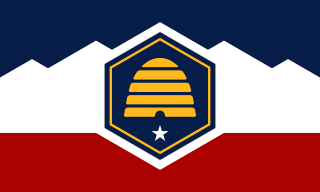
The flag of the State of Utah was adopted in February 2011 and consists of the seal of Utah encircled in a golden circle on a background of dark navy blue. It replaced a previous, albeit rather similar flag that had been in use since 1913. It is one of the state flags of the United States.

ASB Bank Limited, commonly stylised as ASB, is a bank owned by Commonwealth Bank of Australia, operating in New Zealand. It provides a range of financial services including retail, business and rural banking, funds management, as well as insurance through its Sovereign Limited subsidiary, and investment and securities services through its ASB Group Investments and ASB Securities divisions. ASB also operated BankDirect, a branchless banking service that provides service via phone, Internet, EFTPOS and ATMs only.

Sir John Phillip Key is a New Zealand retired politician who served as the 38th prime minister of New Zealand from 2008 to 2016 and as leader of the New Zealand National Party from 2006 to 2016. After resigning from both posts in December 2016 and leaving politics, Key was appointed to the board of directors and role of chairman in several New Zealand corporations.
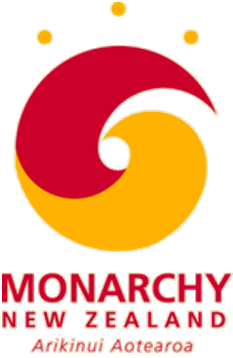
Monarchy New Zealand is a national, non-partisan, not-for-profit organisation whose purpose is to promote, support and defend the constitutional monarchy of New Zealand. In addition to the general public, the organisation's membership includes a number of academics as well as numerous lawyers and political figures. It is currently chaired by Sean Palmer.
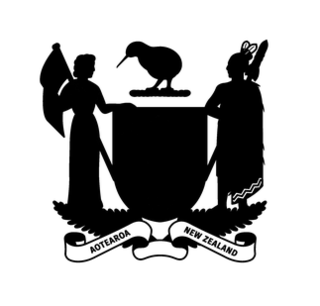
New Zealand Republic Inc. is an organisation formed in 1994 whose object is to support the creation of a New Zealand republic.

Republicanism in New Zealand is the political position that New Zealand's system of government should be changed from a constitutional monarchy to a republic.

Nicola Joanne Wagner is a New Zealand teacher, businesswoman and politician. She represented the Christchurch Central electorate for the New Zealand National Party in the New Zealand Parliament.

Referendums are held only occasionally by the Government of New Zealand. Referendums may be government-initiated or held in accordance with the Electoral Act 1993 or the Citizens Initiated Referenda Act 1993. Nineteen referendums have been held so far. Fourteen were government-led, and five were indicative citizen initiatives.
Change the NZ Flag was a group campaigning for New Zealanders to change the national flag of New Zealand. The group described itself as "an independent, non-political, design-neutral society that is committed to building support for, and involvement with, the flag change process."

A silver fern flag is any flag design that incorporates a silver fern, and is usually a white silver fern on a black background. The silver fern motif is associated with New Zealand, and a silver fern flag may be used as an unofficial flag of New Zealand, to which it is endemic. The silver fern itself is a quasi-national emblem, being used for various official symbols, including the coat of arms of New Zealand and the New Zealand one dollar coin. A number of New Zealand sports teams, such as the cricket team, the Silver Ferns and the All Blacks, use similar silver fern flags as part of their official merchandise. The All Whites association football team use a white background and a black version of the fern.

The Crimes Amendment Act 2007 is an amendment to New Zealand's Crimes Act 1961 which removed the legal defence of "reasonable force" for parents prosecuted for assault on their children.
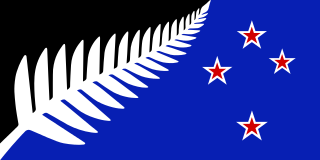
The black, white and blue silver fern flag is a proposed flag for New Zealand by architectural designer Kyle Lockwood. It was first designed using different colours in 2000. It was voted as the preferred alternative New Zealand flag in the first of two New Zealand flag referendums in December 2015, and was used in the second flag referendum in a binding contest against the current New Zealand flag. Despite a UMR poll predicting that the flag would earn only 35% of the vote, the Silver Fern Flag gained a significant minority in the March 2016 referendum with 43.2% of the vote, whilst the existing flag won with 56.6% of the vote.

The New Zealand flag debate is a periodic question over whether the national flag should be changed. For several decades, alternative designs have been proposed, with varying degrees of support. There is no consensus among proponents of changing the flag as to which design should replace the current one. Common criticisms of the existing form of the New Zealand flag are its similarity to the Australian flag and the inappropriateness of retaining the Union Jack in the design. A series of polls conducted since the 1970s have shown that a majority of New Zealanders prefer the current flag.

Hope not Hate is an advocacy group based in the United Kingdom which campaigns against racism and fascism. It has also mounted campaigns against Islamic extremism and antisemitism. It is self-described as a "non-partisan, non-sectarian organisation." The group was founded in 2004 by Nick Lowles, a former editor of the anti-fascist magazine Searchlight. It is backed by various politicians and celebrities, and it has also been backed by several trade unions.
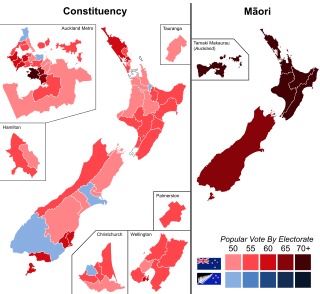
Two referendums were held by the New Zealand Government in November/December 2015 and March 2016 to determine the nation's flag. The voting resulted in the retention of the current flag of New Zealand.

Kyle Simon Lockwood JP is a New Zealand architectural designer based in Melbourne, Australia. He is known for leading the successful campaign for the Government of New Zealand to reintroduce the duration of the New Zealand passport to ten years, and for designing the two flags that came first and second, in the first New Zealand flag referendum. He also successfully lobbied for the introduction of the popular 18+ card.

Whakamana, or The New Zealand Institute for Cannabis Education, Research and Development is New Zealand's first museum dedicated to the history of cannabis use and culture. It was first opened in October 2013 in Dunedin as part of a project spearheaded by Abe Gray, former deputy leader of the Aotearoa Legalise Cannabis Party (ALCP), and Julian Crawford, former ALCP regional spokesperson.
References
- ↑ "Blomkamp Cox: Who We Are". Blomkamp Cox. Archived from the original on 17 December 2013. Retrieved 18 December 2013.
- ↑ Paul Chapman (28 January 2005). "Campaigners want British link removed from New Zealand flag". The Telegraph . Archived from the original on 4 June 2023. Retrieved 19 March 2008.